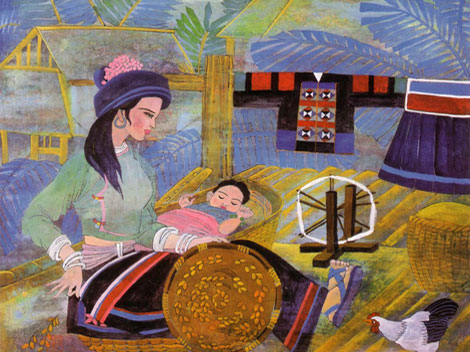The Blangs, with a population of 82.280, mainly live in close communities in the Blang, Xiding, Bada, and Daluo mountains of Menghai County in Xishangbanna, Yunnan Province. The remainder are scattered in Kincang and Simao.

.jpg)
A Blang woman.
.jpg)
Young people enjoy full freedom in love and marriage.
.jpg)
The carrying basket used by Blang women normally has a long belt, which they put on the head when the basket is fully loaded.
.jpg)
Since their farms are far from their houses. Blang people often have lunch in the field.
The Blangs are descendants of the ancient Pus. In the Tang Dynasty, they were called "Puziman". and "Puman" in the Yuan, Ming and Qing dynasties. In the past, the appellation of these people differed from 91 ace to place. After the founding of new China, they were generally named the Blang Nationality in accor?dance with their wishes.
.jpg)
A Blang wedding ceremony.
The Blangs make their homes in a subtropical mountain area about 1.500 to 2.300 meters above sea level. The rolling mountains are covered with thick primeval forests. For the mild and rainy climate, tung and camphor trees are flourishing. Most Blangs engage in farming, growing rice, tea and cotton. Their tea is the raw material for the world famous Pu'er Tea.
The Blang language belongs to the Va-De'ang branch of the Austro-Asiatic family. As the language has no script. Blang people speak the Dai, Va and Chinese languages. Some write Chinese and the Dai language.





